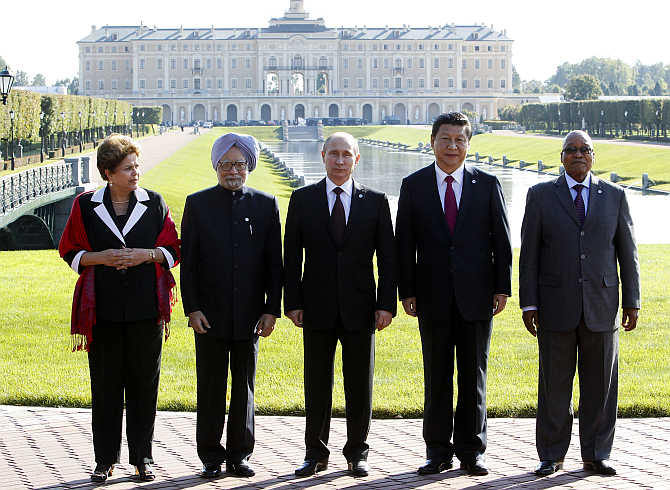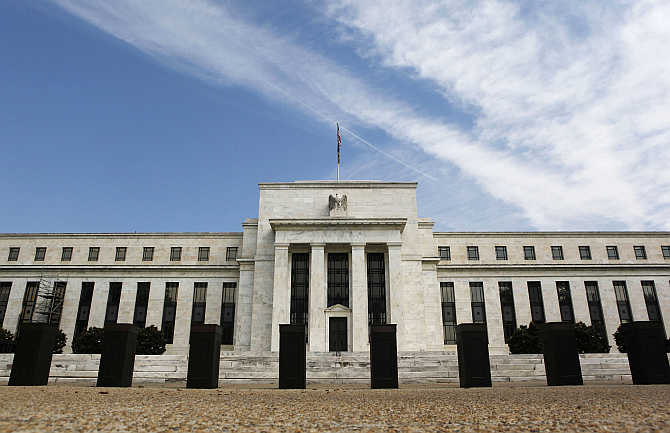
With the United States set to take a call on tapering the Quantitative Easing later this month, Prime Minister Manmohan Singh urged advanced economies to coordinate their monetary policies to avoid a spillover impact on emerging economies, which have seen a sharp depreciation in their currencies.
In his speech at the opening day of G20 Summit here, he said the conventional theory of having a flexible exchange rate to take care of any volatility in capital flows was being questioned due to a spurt in such fluctuation in the wake of developments abroad.
As India faced the daunting task of cutting its current account deficit to 3.7 per cent of GDP in the current financial year from the record 4.8 per cent in the previous year, the Prime Minister assured the world community that the measures would be taken to cut CAD along with fiscal deficit through investor friendly steps.
The target for the Centre's fiscal deficit this year is to cut it to 4.8 per cent of GDP against 4.9 per cent in 2012-13.
“We will continue to work within the framework of an open economy to restore growth to earlier levels. We have undertaken a number of reforms and intend to do more. The reforms ahead are more difficult, relating to control of subsidies, reform of the tax system and reform of the financial sector,” Singh said.
...

The Lok Sabha had on Wednesday cleared the Pension Fund Regulatory and Development Authority Bill first tabled in 2005. As talks of QE tapering gained momentum, the Prime Minister said: "If we accept the need for coordination of fiscal policy among systemically important countries, there is an equally compelling case to cover monetary policy in reserve country currencies. There is certainly room for more extensive consultations and more effective communication on this issue.”
The PM said fiscal consolidation was necessary but the initial targets were perhaps too ambitious. Combined with private sector de-leveraging, it had produced deficiency of demand, which led to slow growth and high unemployment.
The possibility of these negative effects was known but were supposed to be offset by strong structural reforms in industrialised countries. This had not happened at the pace expected, he said. “The policy of unconventional monetary expansion in advanced countries had some success but also had spillover effects. When policy was being loosened, there was a surge in capital flows to emerging markets, which helped some countries finance their current account deficits, while generating upward pressure on the currencies of other countries.”
The conventional view that capital volatility should not be a source of concern as long as exchange rates were flexible was being questioned, he noted.
...

A sudden increases in cross-border flows not only affects the exchange rate but also credit volumes and asset prices, leading to stock market and exchange rate volatility in emerging markets.
“Regulations aimed at increasing the stability of the financial system should not operate to the disadvantage of developing countries. If we cannot moderate the volatility of total capital flows, let us at least avoid amplifying this volatility through the banking system,” Singh added.
The US Federal Reserve’s Open Market Committee meeting, slated for September 17-18, is expected to indicate when the American central bank might start tapering its stimulus programme.
The rupee has depreciated 20.4 per cent against the dollar this financial year. Most of this has come since May 22, when the US Fed had indicated it might consider the tapering of its quantitative easing programme.
“This Summit must send a clear signal of our collective commitment to work together for the revival of growth, the only way of ensuring a sustainable growth in quality jobs… Fiscal consolidation is important for many countries and must remain a key medium-term objective. However, it must be pursued with realistic time paths, keeping in mind the current weaknesses in demand in many countries,” he said.
...

As funding of infrastructure needs assume importance in the wake of volatile capital flows, the Prime Minister regretted that the decisions taken in the previous G20 meeting at Los Cabos have not produced results so far.
"At the Los Cabos summit we directed our Finance Ministers to explore how the G-20 can help, including through more active involvement of the multilateral development banks. We have not yet seen the results of their efforts," he said. He prescribed that the World Bank and the Asian Development Bank could create a special window for ensuring finance in support of infrastructure development.
"Access to this window should be beyond the normal country limits, which otherwise introduce inflexibility," the Prime Minister said. He said such efforts will involve additional capital.
"I hope the G 20 can give a signal that we are willing to provide the capital," Singh said. On international labour mobility in high-end skills, he said there was a need to avoid new restrictive measures in this area. He also stressed the need to develop a framework which could overcome the “too big to fail” problem.